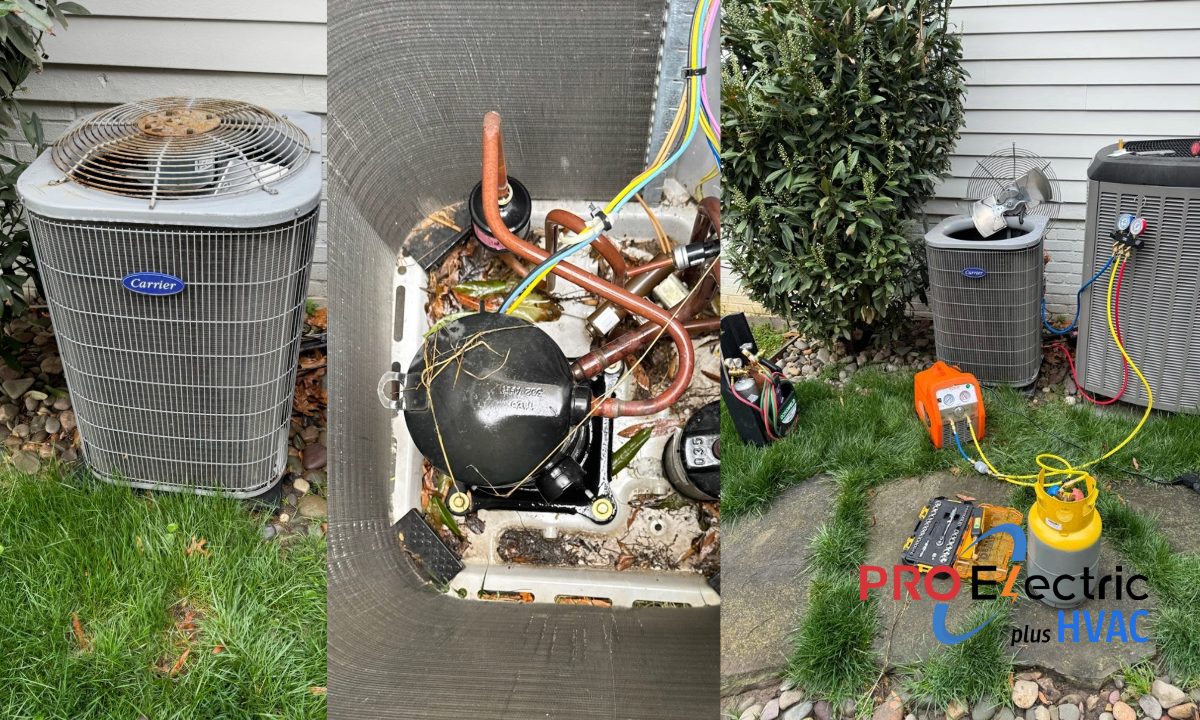Your AC fails to cool appropriately because a burned-out compressor could be responsible.
The AC system’s compressor functions as a heart by circulating refrigerant throughout your home to remove heat.
The entire AC system becomes vulnerable when the compressor fails.
This discussion will cover why compressors burn out, teach you how to identify the issue, and provide steps for repair.
What Causes AC Compressor Burnout in Northern Virginia’s Heat?
By learning the reasons behind compressor burnout, you can stop it from happening.
- Electrical Issues: Damaged wires or fuses lead to acid buildup, which causes the compressor to overheat and stop working.
- Refrigerant Problems: An improper refrigerant level forces the compressor to work harder, which leads to overheating.
- Dirty Coils: Dirty condenser coils prevent proper heat release, forcing the compressor to work harder and potentially leading to overheating.
- Poor Lubrication: Quick wear of compressor moving parts occurs when insufficient lubrication leads to eventual failure.
- Overheating: High voltages, dirty coils, and inadequate ventilation can lead to compressor overheating and subsequent burnout.
Signs Your AC Compressor Might Be Failing
Watch for warning signs through both visual and auditory observations.
- Weird Noises: Your AC unit’s rattling or banging noises indicate possible internal compressor failure. Strange noises from your AC unit indicate potential failure of the compressor’s internal mechanisms.
- Warm Air: A malfunctioning compressor can cause your AC to blow warm air instead of cool air.
- Leaks: Moisture or refrigerant leaks near your AC system suggest possible compressor problems.
- High Energy Bills: When a compressor starts to fail, it forces the AC system to work harder, which results in higher electricity bills.
Diagnosing a Burned-Out Compressor
Think your compressor’s burned out? Here’s how to check:
- Visual Inspection: Check for burned wiring and blackened spots on the compressor during your inspection.
- Check the Circuit Breaker: A faulty compressor could be why your AC’s breaker keeps tripping.
- Listen for Noises: Strange noises during AC startup can indicate problems with the compressor.
- Professional Assessment: Professional technicians should be hired to perform electrical tests and conduct a complete system inspection.
Preventing Compressor Burnout
To keep your compressor in top shape:
- Regular Maintenance: Schedule annual check-ups to catch issues early.
- Clean Coils: To maintain proper heat release functionality, clean all dirt and debris from the condenser coils.
- Monitor Refrigerant Levels: The right refrigerant level will protect your compressor from an excessive workload.
- Ensure Proper Ventilation: The outdoor unit requires adequate airflow to avoid overheating problems.
Steps to Follow When Your AC Compressor Experiences a Burnout
If you suspect a burnout:
- Turn Off the System: Terminate your AC system operation to stop any additional damage from occurring.
- Call a Professional: A certified HVAC technician will evaluate the damage and suggest necessary repairs or replacement solutions.
- Consider Your Options: The age and condition of your AC system will dictate whether replacing the whole unit becomes more economical than just fixing the compressor.
Maintaining your AC system and resolving problems quickly helps stop compressor burnout to ensure your home stays cool and comfortable.



